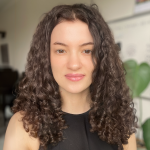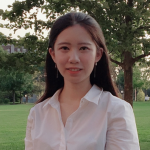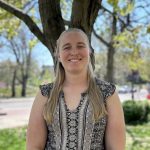FoVea is pleased to announce the winners of our 2025 FoVea Travel and Networking Award.
The FoVea Travel and Networking Award was open to members of the Vision Science Society (VSS) who identify as women and are in pre-doctoral, post-doctoral, pre-tenure faculty, or research scientist positions. The award covers costs involved with attending the VSS meeting, including membership fees, conference registration fees, and travel expenses.
FoVea created this award as part of its mission to advance the visibility, impact, and success of women in vision science. A recent report from Cooper and Radonjić (2016) indicated that in 2015, the ratio of women to men in VSS was near equal at the pre-doctoral level (1:1.13), but decreased as career stage increased. The decline is symptomatic of forces that impede the professional development of female vision scientists. A key aspect of professional development is building a professional network to support scientific pursuits and to provide mentorship at critical junctions in one’s academic career. The FoVea Travel and Networking Award will help women vision scientists build their professional network by encouraging them to meet with at least two Networking Contacts at the VSS meeting to discuss their research and consider potential for collaboration.
9 awards were funded by an NSF grant and 1 award was funded by the Visual Cognition journal.
Casey Becker
 Dr Casey Becker is a postdoctoral researcher in the Department of Neurosurgery at the University of Pittsburgh, studying brain responses to faces in natural settings. She combines eye tracking with intracranial EEG and MEG to examine neural activity during natural eye movements toward faces, and uses machine learning to decode complex, real-world data. Her work aims to improve the ecological validity of social vision research by employing more naturalistic tasks and stimuli. Dr Becker earned her PhD in visual and cognitive neuroscience from RMIT University in Australia, where she investigated the neural mechanisms of dynamic face perception, including the perception of AI-generated faces (deepfakes).
Dr Casey Becker is a postdoctoral researcher in the Department of Neurosurgery at the University of Pittsburgh, studying brain responses to faces in natural settings. She combines eye tracking with intracranial EEG and MEG to examine neural activity during natural eye movements toward faces, and uses machine learning to decode complex, real-world data. Her work aims to improve the ecological validity of social vision research by employing more naturalistic tasks and stimuli. Dr Becker earned her PhD in visual and cognitive neuroscience from RMIT University in Australia, where she investigated the neural mechanisms of dynamic face perception, including the perception of AI-generated faces (deepfakes).
Wing Kwan Hannah Chu

Wing Kwan Hannah Chu is a first-year Global PhD Fellow in Psychology (Cognition and Perception), jointly supervised by Dr. Clayton Curtis at New York University (NYU) and Dr. Kartik Sreenivasan at NYU Abu Dhabi. She previously held a Post-Graduation Research Fellowship at NYU Abu Dhabi with Dr. Bas Rokers, studying artificial scotomas in the motion domain. She is broadly interested in how different cognitive functions, such as perception and working memory, can potentially be implemented using shared neural mechanisms in the brain. In her current research, she employs psychophysics, fMRI, and computational modeling to study the storage of visual and spatial working memory and the roles of various brain regions in these processes.
Giuliana Giorjiani
 Giuliana Martinatti Giorjiani is a PhD candidate with Dr. Rosanne Rademaker at the Ernst Strüngmann Institute for Neuroscience in Cooperation with the Max Planck Society in Frankfurt am Main, Germany. Her research focuses on how behavioral demands shape prospective and retrospective representations of visual information in the earlier stages of visual processing in the brain. Specifically, she investigates the role of early visual cortex during visual working memory and spatiotemporal predictions. To address these questions, she employs a combination of methods, including fMRI, psychophysics, eye tracking, and computational models.
Giuliana Martinatti Giorjiani is a PhD candidate with Dr. Rosanne Rademaker at the Ernst Strüngmann Institute for Neuroscience in Cooperation with the Max Planck Society in Frankfurt am Main, Germany. Her research focuses on how behavioral demands shape prospective and retrospective representations of visual information in the earlier stages of visual processing in the brain. Specifically, she investigates the role of early visual cortex during visual working memory and spatiotemporal predictions. To address these questions, she employs a combination of methods, including fMRI, psychophysics, eye tracking, and computational models.
Chenxiao Guan
 Chenxiao Guan is a postdoctoral researcher in the Department of Psychology and Behavioral Sciences at Zhejiang University, China, working with Drs. Hui Chen and Mowei Shen. She received her PhD in Psychological and Brain Sciences from Johns Hopkins University, working with Dr. Chaz Firestone. Chenxiao’s research spans visual perception, attention, working memory, and aesthetics. During her PhD, she focused on investigating the perception of possible objects using Tetris-like stimuli, expanding the scope of vision science from seeing “what is” to seeing “what could be”. In her current postdoc position, she expands this research by probing the cognitive processes of possible object perception across different populations, while developing new studies on aesthetics through psychophysical and computational approaches.
Chenxiao Guan is a postdoctoral researcher in the Department of Psychology and Behavioral Sciences at Zhejiang University, China, working with Drs. Hui Chen and Mowei Shen. She received her PhD in Psychological and Brain Sciences from Johns Hopkins University, working with Dr. Chaz Firestone. Chenxiao’s research spans visual perception, attention, working memory, and aesthetics. During her PhD, she focused on investigating the perception of possible objects using Tetris-like stimuli, expanding the scope of vision science from seeing “what is” to seeing “what could be”. In her current postdoc position, she expands this research by probing the cognitive processes of possible object perception across different populations, while developing new studies on aesthetics through psychophysical and computational approaches.
Kelly Hiersche
 Kelly Hiersche graduated with a B.S. in Physics from Adelphi University in 2017 and then spent two years as a high school math teacher in Eastern Kentucky. Currently, she is a Cognitive Neuroscience PhD candidate at The Ohio State University, working with Dr. Zeynep Saygin. Her research interests include understanding the development of functionally specialized regions in the brain, as well as neural mechanisms (i.e., connectivity, structure) that support language, reading, visual recognition, and social cognition. Her work primarily uses tools like functional and structural MRI, and she studies the fetal, infant, toddler, and early childhood periods. Her broader research motivation is to help bridge the gap between research, policy and education.
Kelly Hiersche graduated with a B.S. in Physics from Adelphi University in 2017 and then spent two years as a high school math teacher in Eastern Kentucky. Currently, she is a Cognitive Neuroscience PhD candidate at The Ohio State University, working with Dr. Zeynep Saygin. Her research interests include understanding the development of functionally specialized regions in the brain, as well as neural mechanisms (i.e., connectivity, structure) that support language, reading, visual recognition, and social cognition. Her work primarily uses tools like functional and structural MRI, and she studies the fetal, infant, toddler, and early childhood periods. Her broader research motivation is to help bridge the gap between research, policy and education.
Yin-ting Lin
 Yin-ting Lin is a 4th year PhD student in Cognitive Psychology at The Ohio State University, advised by Dr. Andrew Leber and Dr. Julie Golomb. Prior to graduate school, she received her BA in Psychology from New York University Abu Dhabi and worked as a postbac research assistant with Dr. Daryl Fougnie. She is interested in understanding how people optimize encoding and storage of information into visual working memory. Her research examines the extent to which individual differences in strategy use are related to cognitive ability, and she also uses EEG to study how strategy use enhances working memory performance.
Yin-ting Lin is a 4th year PhD student in Cognitive Psychology at The Ohio State University, advised by Dr. Andrew Leber and Dr. Julie Golomb. Prior to graduate school, she received her BA in Psychology from New York University Abu Dhabi and worked as a postbac research assistant with Dr. Daryl Fougnie. She is interested in understanding how people optimize encoding and storage of information into visual working memory. Her research examines the extent to which individual differences in strategy use are related to cognitive ability, and she also uses EEG to study how strategy use enhances working memory performance.
Veronica Pisu
 Veronica Pisu is a Lecturer at the University of Southampton, UK, where she obtained her PhD in Psychology working with Professor Wendy Adams and Dr Erich Graf. After her PhD, she went on for a postdoc working with Dr Guido Maiello. She previously earned a Master’s in Psychobiology and Cognitive Neuroscience from the University of Parma, Italy, working with Professor Nicola Bruno. Her broad research interest is in human multisensory perception and action. How do humans combine vision, touch, and prior knowledge to make sense of object features such as size, shape, and weight, and adjust their actions accordingly? She employs psychophysics, movement analysis (hand motion tracking, grasping force analysis, eye tracking), and computational modelling to investigate visual and haptic perception and motor control in typical and clinical populations.
Veronica Pisu is a Lecturer at the University of Southampton, UK, where she obtained her PhD in Psychology working with Professor Wendy Adams and Dr Erich Graf. After her PhD, she went on for a postdoc working with Dr Guido Maiello. She previously earned a Master’s in Psychobiology and Cognitive Neuroscience from the University of Parma, Italy, working with Professor Nicola Bruno. Her broad research interest is in human multisensory perception and action. How do humans combine vision, touch, and prior knowledge to make sense of object features such as size, shape, and weight, and adjust their actions accordingly? She employs psychophysics, movement analysis (hand motion tracking, grasping force analysis, eye tracking), and computational modelling to investigate visual and haptic perception and motor control in typical and clinical populations.
Zhenan Shao
 Zhenan Shao is a Ph.D. candidate in the Department of Psychology at the University of Illinois Urbana-Champaign, working with Dr. Diane M. Beck. She earned her B.S. in Psychology from the University of Minnesota, Twin-Cities, where she worked with Dr. Sheng He. Her research investigates how the human visual system maintains robust perception in dynamic environments, a remarkable capability that current AI systems still struggle with. Using computational modeling and neuroimaging, she has demonstrated that the geometric structure of human neural representations plays a unique role in supporting perceptual robustness, showing potential for building more resilient AI. Moving forward, she aims to better understand how visual robustness is achieved in the brain and apply these insights to develop trustworthy, generalizable AI systems for critical real-world applications. To read more about her research, visit: https://shaox192.github.io/
Zhenan Shao is a Ph.D. candidate in the Department of Psychology at the University of Illinois Urbana-Champaign, working with Dr. Diane M. Beck. She earned her B.S. in Psychology from the University of Minnesota, Twin-Cities, where she worked with Dr. Sheng He. Her research investigates how the human visual system maintains robust perception in dynamic environments, a remarkable capability that current AI systems still struggle with. Using computational modeling and neuroimaging, she has demonstrated that the geometric structure of human neural representations plays a unique role in supporting perceptual robustness, showing potential for building more resilient AI. Moving forward, she aims to better understand how visual robustness is achieved in the brain and apply these insights to develop trustworthy, generalizable AI systems for critical real-world applications. To read more about her research, visit: https://shaox192.github.io/
Hannah Small
 Hannah is a fourth year PhD student working with Dr. Leyla Isik in the Cognitive Science Department at Johns Hopkins University. She interested in how the human mind extracts information about the complex world of social interactions, especially how the brain spatially organizes the relevant systems, how they interact, and why this neural architecture works. So far in her PhD, she has pursued these questions with a combination of fMRI and deep neural networks to study the simultaneous visual and linguistic processing of naturalistic stimuli. Before graduate school, she studied how the brain perceives and produces language in Dr. Ev Fedorenko’s lab at MIT.
Hannah is a fourth year PhD student working with Dr. Leyla Isik in the Cognitive Science Department at Johns Hopkins University. She interested in how the human mind extracts information about the complex world of social interactions, especially how the brain spatially organizes the relevant systems, how they interact, and why this neural architecture works. So far in her PhD, she has pursued these questions with a combination of fMRI and deep neural networks to study the simultaneous visual and linguistic processing of naturalistic stimuli. Before graduate school, she studied how the brain perceives and produces language in Dr. Ev Fedorenko’s lab at MIT.
Katia Steinfeld
 Katia is a medical doctor and PhD candidate in neuroscience at the University of Lausanne, advised by Prof. Micah M. Murray. Currently, she is a visiting scholar at the Carrasco Lab at New York University, where she is collaborating with Prof. Marisa Carrasco. Her research investigates how mild myopia shapes visual processing and attention. She examines how optical blur alters neural encoding and sensory representations across the visual field, using EEG, eye tracking, and psychophysics. Katia also founded and directs Escolhares, an NGO that provides eye care to children in underserved areas of Brazil. She is committed to developing accessible tools and bridging clinical, scientific, and social domains through translational research.
Katia is a medical doctor and PhD candidate in neuroscience at the University of Lausanne, advised by Prof. Micah M. Murray. Currently, she is a visiting scholar at the Carrasco Lab at New York University, where she is collaborating with Prof. Marisa Carrasco. Her research investigates how mild myopia shapes visual processing and attention. She examines how optical blur alters neural encoding and sensory representations across the visual field, using EEG, eye tracking, and psychophysics. Katia also founded and directs Escolhares, an NGO that provides eye care to children in underserved areas of Brazil. She is committed to developing accessible tools and bridging clinical, scientific, and social domains through translational research.
You can view past recipients here.